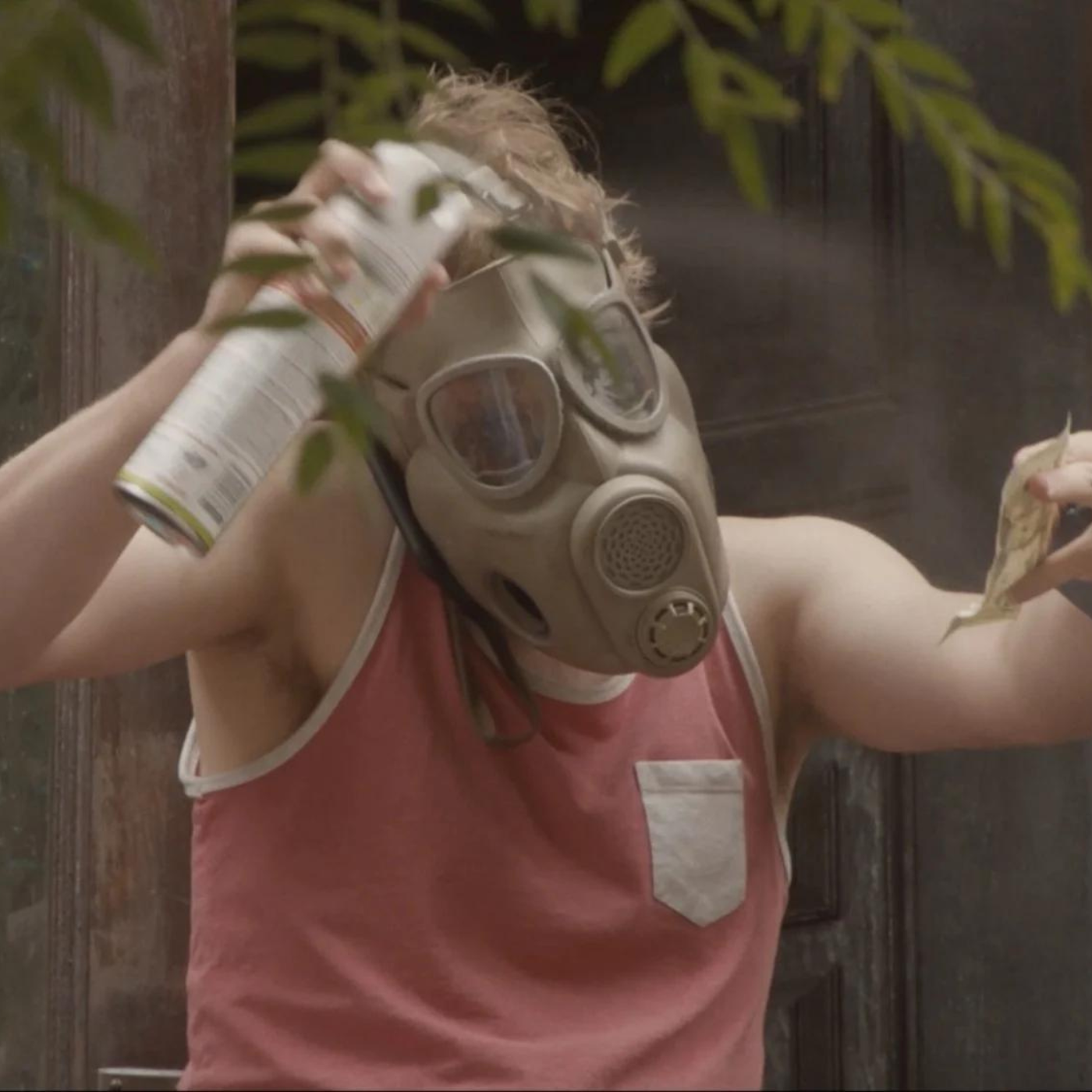- Studio Dirt
- Posts
- Dourifians
Dourifians
Only Brad Dourif fans.

Chris Randle on the horrific artistry hidden behind Chucky's voice.
In 1979 the director John Huston adapted Wise Blood, Flannery O’Connor’s first novel, about a Jesus-scorning drifter who starts preaching “the Church of Truth Without Christ.” It’s a comedy of sorts. Untroubled by religion, Huston was not the obvious choice for this peculiarly Southern parable, but he cast the right lead.
A boyish Brad Dourif plays the protagonist Hazel Motes at skewed and rigid angles, teeth forever clenched. He responds to seduction by covering his face with his hat, as if posed for a funeral viewing. When I told someone I was writing about Dourif, they were sad to hear he’d died—why else would that local art cinema be hosting a retrospective? But in fact the actor is merely retired, and even made a couple appearances during his Anthology Film Archives tribute.
After AFA screened Wise Blood earlier this month, a question came up: What made you try for that role? “I always loved the story of St. Francis of Assisi,” Dourif replied, “because he was batshit crazy. If God told him to jump off a bridge, he’d jump off a bridge.”

There’s still traces of that fey boy in the 74-year-old man. Dourif came from an upper-class West Virginia family (his mother acted before him). He dropped out of college and moved to New York, underwent the standard Method training, and started doing theater.
Dourif received an Oscar nomination for his first film credit, as the timid psychiatric patient Billy Bibbit in One Flew Over the Cuckoo’s Nest, and then spent the rest of his career writhing away from such agreeable roles. The ones he did take aren’t always villains, or legibly villainous. He was the dedicated frontier doctor on Deadwood, and a martyred activist lawyer for Ken Loach. But Dourif’s filmography does contain many serial killers, from a self-styled psychic to the devil-doll Chucky—should the latter character’s previous murders as a human count separately? He even managed to play a lethal sociopath on Star Trek, where the act of killing normally occasions long moral debates. None of these disturbed characters fit a neat diagnosis. Their intensity leaps and arcs.
Dourif’s final appearance during that Anthology Film Archives retrospective came alongside the nearly unseen 1990 thriller Horseplayer. A Los Angeles couple amuse themselves by toying with the reclusive gambler one floor up, failing to realize their neighbor is not so harmless a weirdo as he appears. The budget was low enough that cinematography couldn’t afford a dolly. Every scene used claustrophobic blocking instead, so that plot twists seem to be staged by the horseplayer’s paranoia. At the couple’s gallery show, Dourif finds distorted portraits of himself—an act that feels as criminal as his own, and more premeditated. “Let’s face it, I’ve played a lot of killers,” he said during the Q&A afterwards. Why did this one stand out? “He was somebody desperately trying to shut themselves down, turn themselves off…” Dourif paused. “I think we’re all at some point terrified of ourselves.”
You can find a few ancestors in classical Hollywood, bug-eyed character actors with faces like waning moons. I think of Peter Lorre, the émigré from a nameless city, or Elisha Cook Jr., whose cowardly noir henchmen seem 17 and 45 simultaneously. These actors were typecast for torment, to look morose at a nightclub or stare through a glass of poison; Dourif got more chances to revel in his otherness. He’s often explained how every career decision simplified after standing above his sleeping baby: “If they have a check, a camera, and a script, I’m there.”
These actors were typecast for torment, to look morose at a nightclub or stare through a glass of poison…
Indifference to genre or scale allows Dourif to warp the frame of many disparate movies. We watched him reminisce about starring in the point-and-click adventure game Myst III, one of the first actors to perform against entirely digitized scenery. I’m fond of his deranged military scientist from 1998’s Alien Resurrection, which has some good ideas imprisoned by Joss Whedon dialogue. Presented with a captive xenomorph, Dourif’s Dr. Gediman flirtatiously mimics its movements, kissing the glass between them. Sexual terror slithers below the conscious mind in every Alien film, but nothing these creatures might imply frightens Gediman. He wants to fuck the alien.
Some performances move through Hollywood machinery with the cryptic intimacy of private jokes. Call them Dourifian. For Peter Jackson’s Lord of the Rings trilogy, as the sycophant Grima Wormtongue, Dourif got made up like a silent-cinema villain: greasy forelocks hanging over shaved eyebrows. The actor once noted that, amidst otherworldly wizards and evil demigods, he took the role of Tolkien’s only human antagonist, with human weakness. Rarely subtle (“Grima Wormtongue”), his work still unnerves expectations. As his master Saruman raises a vast army, Grima can be seen crying—a strange minor chord interrupting all the opera.
“After you do something,” Dourif told one interviewer, “you should destroy it completely in your head, because no two roles are the same.” Those words come to mind watching him play yet another serial killer. As Satan’s vessel in The Exorcist III, his monologues to a weary police lieutenant flaunt their sick theater: “A decapitated head can continue to see for approximately twenty seconds. So when I have one that’s gawking, I always hold it up so it can see its body. A little extra I throw in for no added charge.” Eventually the cop belts him across the face. Dourif looks upwards, blood and tears both weeping prettily, and pouts: “A few boos from the gallery, I see.” The face of a Madonna who strangled her child.
Those features made Dourif a favorite of David Lynch and Werner Herzog, but his longest-running collaboration by far is an intangible one, voicing the homicidal doll Chucky. Divorced from physical acting, that slight body stooped for effect, you can appreciate his range. Chucky often veers from youthful innocence to maniacal rage within a a single sentence. When Jennifer Tilly joined the series with 1998’s Bride of Chucky, Dourif gained the perfect accomplice: Another human who sounds like a cartoon.
Divorced from physical acting, that slight body stooped for effect, you can appreciate his range.
That entry also marked a turn towards black comedy, and Dourif clearly enjoys throttling his soft, solicitous drawl into an imp of the perverse. “Chucky loves his job,” he beamed to our Q&A. So much so that Dourif has only mostly retired—he calls Chucky’s creator Don Mancini “family,” offering to reprise the role whenever asked. He’s been menacing unsuspecting parents for 35 years.
Mancini was the lone gay auteur behind a slasher-era horror series, and the queer subtext it always had is now lurid neon. (What do they say about boys who play with dolls?) Susan Sontag mentioned Tiffany lamps in her canon of camp; the later Chucky movies imagine one beating you to death.
In 2004’s Seed of Chucky the doll is dismayed to learn that his gentle nonbinary child hates killing people, however tedious they might be. Their conflict improbably recalls John Waters’s Female Trouble, and Waters himself cameos as a sleazy paparazzo, whose face gets melted off by photography chemicals. “Hey, I’m not a monster!” Chucky insists to a different queer kid; he may have a body count in the hundreds, but he’s an ally. And why not take that joke seriously? All flesh is plastic inside a dollhouse. The recent Chucky TV series drafted Dourif’s daughter Fiona to play his younger human self. Even beneath prosthetics, they share the same eyes: Huge and delicate, roving for a place to dwell. 🪓

TUESDAY TERRORS
|

